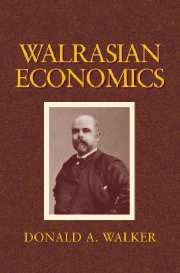Book contents
- Frontmatter
- Contents
- Preface
- Introduction
- Part I Walras's ideas
- 1 General philosophy and methodology
- 2 Economic philosophy and methodology
- 3 Methods of evaluation of economic theory
- 4 Human nature
- 5 Basic sub-models
- 6 Rationale for the written pledges sketch and its characteristics
- 7 Some bibliographical remarks
- 8 The definitive bibliography of the writings of Léon Walras
- Part II Walras's influence
- References
- References and Bibliography for Chapter 11
- Index
4 - Human nature
Published online by Cambridge University Press: 02 September 2009
- Frontmatter
- Contents
- Preface
- Introduction
- Part I Walras's ideas
- 1 General philosophy and methodology
- 2 Economic philosophy and methodology
- 3 Methods of evaluation of economic theory
- 4 Human nature
- 5 Basic sub-models
- 6 Rationale for the written pledges sketch and its characteristics
- 7 Some bibliographical remarks
- 8 The definitive bibliography of the writings of Léon Walras
- Part II Walras's influence
- References
- References and Bibliography for Chapter 11
- Index
Summary
Introduction
Walras's treatment of the general characteristics of human nature was an application of his general philosophy and methodology to that aspect of reality. His treatment of human nature in relation to economic situations was an application of his economic philosophy and methodology to that specific aspect of reality. His ideas on both of these matters had many similarities with the ideas of scholars who preceded him, but he is more responsible than anyone else for a particular conception of human nature being imprinted indelibly on neoclassical economics and on the vast majority of all modern economic models. It is interesting, therefore, to study his ideas about human nature in general, and to examine how he arrived at his conception of an economic agent and his justification for it.
Walras's ideas about human nature have been studied by a number of writers, but there are some respects in which our knowledge of and understanding of his ideas can be deepened, and this chapter undertakes to do that. The numerous aspects of Walras's ideas considered here include his recognition that human nature has many different facets, his difficulties in dealing with the notion of free will, his identification of real and ideal types regarding human nature, the contrast between his knowledge of human nature and his concept of economic man, and his use of the latter in a series of steps of reasonings about the functioning of his economic model.
- Type
- Chapter
- Information
- Walrasian Economics , pp. 113 - 139Publisher: Cambridge University PressPrint publication year: 2006



